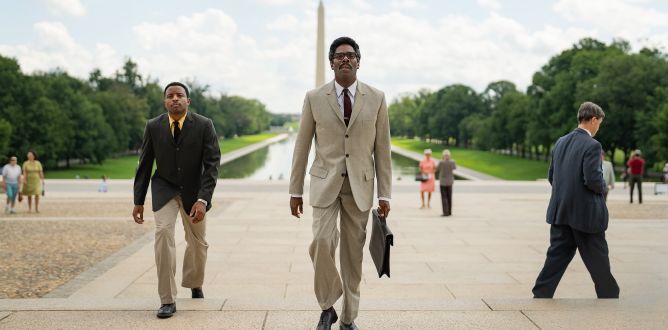Rustin Parent Guide
Powerful and immersive, this film brings an overlooked civil rights icon back into the spotlight.
Parent Movie Review
The largest demonstration in American history, 1963’s March on Washington for Jobs and Freedom, is perhaps best known for Martin Luther King Jr.’s iconic “I Have a Dream” speech. The massive public support demonstrated by 250,000 participants contributed to the passage of the Civil Rights Act of 1964.
What has been forgotten over the past few decades is that King was not alone in planning the march; in fact, the driving force behind it was his old friend, Bayard Rustin. Born to a Black, Quaker family, Rustin grew up devoted to pacifism, justice, and civil rights. Controversy swirled around Rustin throughout his life, not only for his dedication to non-violence (which extended to a prison sentence for being a conscientious objector), but also due to a brief stint as a Communist, and because of his homosexuality.
Given Bayard Rustin’s massive contributions to the fight for racial equality, this moviecould easily have been a miniseries, but director George C. Wolfe carefully selected episodes from Rustin’s life to illuminate his personal story. The film opens in 1960, when Rustin is working with Martin Luther King Jr. to plan a protest at the Democratic National Convention in Los Angeles. When MLK betrays his friend, Rustin leaves the movement.
Rustin soon discovers that he can’t leave the fight for racial equality behind. When President Kennedy announces forthcoming civil rights legislation in 1963, Rustin is convinced that high levels of public pressure are necessary to prevent the bill from being watered down. He wants to organize a demonstration by 100,000 people, but to do so, he’s going to need to bury the hatchet with King – and make sure his personal life stays out of the spotlight.
There are few things I like more than a good history film and Rustin hits the mark. Colman Domingo’s performance as the titular protagonist is immersive and authentic, bringing viewers into his life and his fight for justice. Although it’s focused on Rustin, the film also has a large cast of secondary characters (real and fictional) who illuminate both Rustin’s personality and the times in which they live.
If you’re considering watching this movie with teens, you will want to be aware of the negative content, specifically disturbing racial violence (with some bloody injuries), racial and homophobic slurs, alcohol consumption and a single scene of marijuana use. There is also a brief, dimly lit gay sexual encounter involving a married man, without explicit nudity.
Alongside the PG-13 rated content, this film provides strong positive messages about human dignity, self-respect, courage, loyalty, forgiveness, persistence, and racial equality. Bayard’s commitment to non-violence is admirable, and he says “If we desire a society of peace, then we cannot achieve such a society through violence”. This is a powerful film, and one that left me choked up at the conclusion. As our times feel increasingly dark and divided, perhaps we can learn something from Bayard Rustin about living the change we seek.
Directed by George C. Wolfe. Starring Colman Domingo, Chris Rock, Glynn Turman. Running time: 106 minutes. Theatrical release November 17, 2023. Updated December 20, 2023Watch the trailer for Rustin
Rustin
Rating & Content Info
Why is Rustin rated PG-13? Rustin is rated PG-13 by the MPAA for thematic material, some violence, sexual material, language including racial slurs, brief drug use, and smoking.
Violence: People are seen with bloody injuries. Someone talks about being firebombed and beaten with a pipe. New footage shows protesters in Birmingham being attacked by police dogs and police men with high pressure hoses. Police attack a black man on a bus: he is punched, kicked, put in a chokehold, and thrown off the bus. The murder of Medger Evers is seen on a newspaper headline. There are brief scenes of a gay man being arrested and roughly handled by police.
Sexual Content: There’s some discussion of homosexuality. Two shirtless men embrace. There are scenes of men kissing. There is a brief, dimly lit scene of two men having sex, one of whom is married to a woman. There is no explicit detail. There is an crude, incestuous comment.
Profanity: The script contains a half dozen scatological curses, and a smattering of terms of deity, minor profanities, and anatomical expressions. There are also four racial slurs and a homophobic slur. A crude sexual slang term is directed at a character and his mother.
Alcohol / Drug Use: Adults smoke cigarettes and drink alcohol, sometimes to the point of intoxication. A man smokes marijuana.
Page last updated December 20, 2023
Rustin Parents' Guide
You can learn more about Bayard Rustin and the 1963 March on Washington at the following links:
Wikipedia: Bayard Rustin
ScreenRant: Rustin Ending Explained
BrainyQuote: Bayard Rustin Quotes
Wikipedia:
YouTube: Netflix: The March on Washington Organizers Reflect on Their Work with Bayard Rustin
YouTube: Bayard Rustin Speaking at the March on Washington
PBS: Brother Outsider: Presidential Medal of Freedom Ceremony
Loved this movie? Try these books…
Historian John D’Emilio tackles a biography of the civil rights activist in Lost Prophet: The Life and Times of Bayard Rustin.
You can read Rustin’s own words in his books Strategies for Freedom: The Changing Patterns of Black Protest and I Must Resist: Bayard Rustin’s Life in Letters.
Home Video
Related home video titles:
If you are interested in more films about civil rights, check out our list of Movies for Black History Month.

